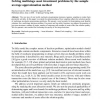Free Online Productivity Tools
i2Speak
i2Symbol
i2OCR
iTex2Img
iWeb2Print
iWeb2Shot
i2Type
iPdf2Split
iPdf2Merge
i2Bopomofo
i2Arabic
i2Style
i2Image
i2PDF
iLatex2Rtf
Sci2ools
109
click to vote
MP
2006
2006
Solving multistage asset investment problems by the sample average approximation method
The vast size of real world stochastic programming instances requires sampling to make them practically solvable. In this paper we extend the understanding of how sampling affects the solution quality of multistage stochastic programming problems. We present a new heuristic for determining good feasible solutions for a multistage decision problem. For power and log-utility functions we address the question of how tree structures, number of stages, number of outcomes and number of assets affect the solution quality. We also present a new method for evaluating the quality of first stage decisions. Key words. Stochastic programming
Related Content
| Added | 14 Dec 2010 |
| Updated | 14 Dec 2010 |
| Type | Journal |
| Year | 2006 |
| Where | MP |
| Authors | Jörgen Blomvall, Alexander Shapiro |
Comments (0)

